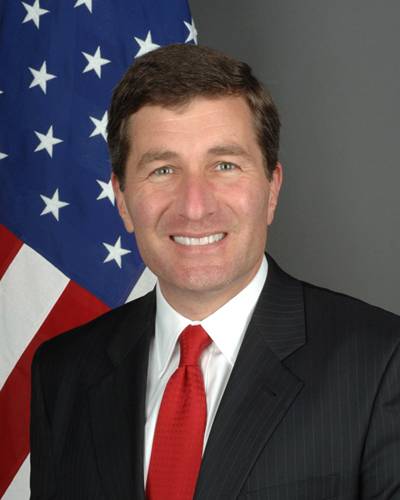Norman Borlaug Centennial Q&A's with Experts:
If Norman Borlaug posed the following questions to you... what would you tell him?

"The general population should learn as much as possible about food security and nutrition at home and abroad."
Charles H. Rivkin, Assistant Secretary of State for Economic and Business Affairs
United States Dept. of State
Q: What’s the one thing – the single most important – that we need to address to solve food insecurity?
A: Sustained political commitment at the global, national, and local level, without question, is the single most important thing needed to resolve global food insecurity. With that commitment, proactive and meaningful policies to adopt and implement “climate smart” agriculture policies, adoption of advanced agricultural technologies and innovation, along with continued investment in infrastructure, nutrition, and social safety nets to protect the most vulnerable will be essential in meeting the challenges of feeding the world.
Q: Do you think we can feed 9 billion people by the year 2050? If so, why? If not, why not?
A: From my discussions with agricultural leaders here in the Midwest and around the world, I am confident that we are on the right path to meet this challenge if we continue to leverage the technological and the ecological know-how of American scientists and farmers to sustainably feed a growing planet.
Q: Where are the biggest gaps right now in the food system?
A: Global efforts to ensure food security and nutrition require sustained effort at every level to build sustainable food systems and value chains, particularly in Africa and other developing regions where population growth and extreme poverty rates are especially high. Reducing food waste and loss is one area where more work must be done, as is adopting modern biotechnology and providing better support for small-holder farmers, particularly women farmers. There is a great need for timely information about weather and markets so that farmers can maximize both productivity and profitability. And recognizing the role of fisheries and aquaculture in combating food insecurity and under-nutrition, as well as responsible stewardship of our threatened oceans, is critical.
Q: What’s one piece of advice you would give to young people?
A: We need your ingenuity to deal with the global challenges ahead. Get involved in new ways to improve agriculture. Youth leaders with firsthand knowledge of the complexities of agriculture will help guide our decision makers in promoting smart policies that increase food production, improve supply chains and market access, reduce post-harvest loss, and improve nutrition.
Q: How would you explain what you do, and why it’s important, to a 10-year-old?
A: As Assistant Secretary of State for Economics and Business Affairs, it is my job to help open up opportunities for the men and women who work for and support our great country so they can thrive in this interconnected world. That’s important for you because it means your parents, your community and your country will have a better chance of supporting the dreams you may not even know you have yet.
Q: Within your area of expertise, what is one misunderstood or neglected topic you could shed some light on for readers?
A: The Department of State has an asset that nobody else in the U.S. government has and nobody else in business has -- shoes on the ground in over 200 embassies around the world. These dedicated professionals are at the forefront of efforts to create jobs and enhance prosperity and stability at home and abroad by reducing barriers to trade and investment, expanding markets, and promoting policies for growth and development.
Q: What’s one thing the general population could do to make an impact on global food security?
A: Learn, learn, learn! The general population should learn as much as possible about food security and nutrition at home and abroad. Food security and nutrition are inextricably related to critical issues like climate change, political stability, and human and economic development. As we learn more about these issues, we become aware of the importance of our individual choices, of our ability to support policies, and where we can best contribute – financially, professionally, or as a volunteer – to help improve global food security and nutrition in the United States and around the world.
Q: What is one of your favorite quotes or words to live by?
A: Secretary of State John Kerry has said, “economic policy is foreign policy,” and he has set forth a challenge of building a vision of shared prosperity for the 21st century. The State Department integrates economic policy into everything we do.
Q: Share with us one of your most unique life experiences and what it taught you.
A: In the 1970s, my stepfather owned a 150-acre soybean farm in Lacrosse, Indiana. So when I was a kid, my brother and I spent a little time there. In those days, my only thought was: “Gee, this is great!” The world seemed a lot less complicated. Little did I know that soybeans would soon become a staple of the world. And I never imagined that one day I’d be Assistant Secretary of State for Economics and Business Affairs, joining with the global community in grappling with one of the great questions of our time: “How do we sustainably feed nine billion people by the year 2050?”


